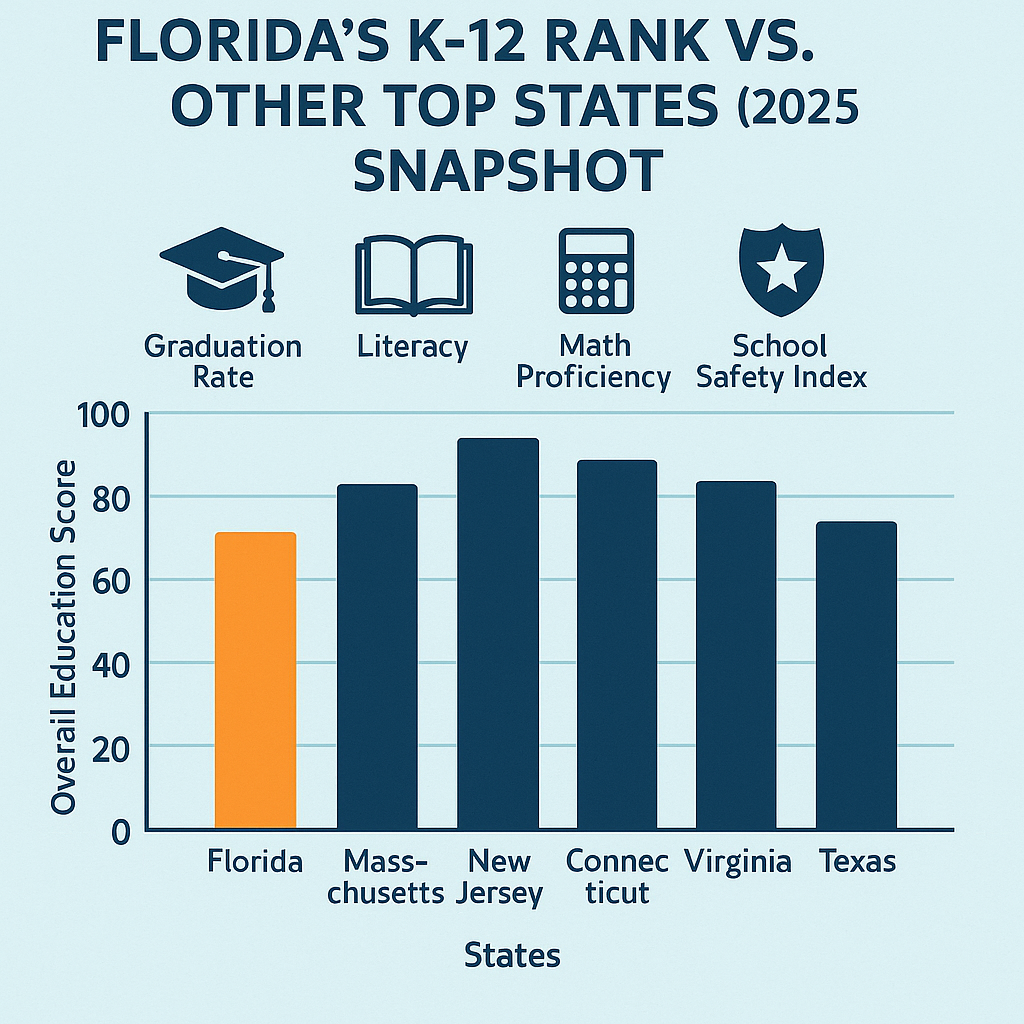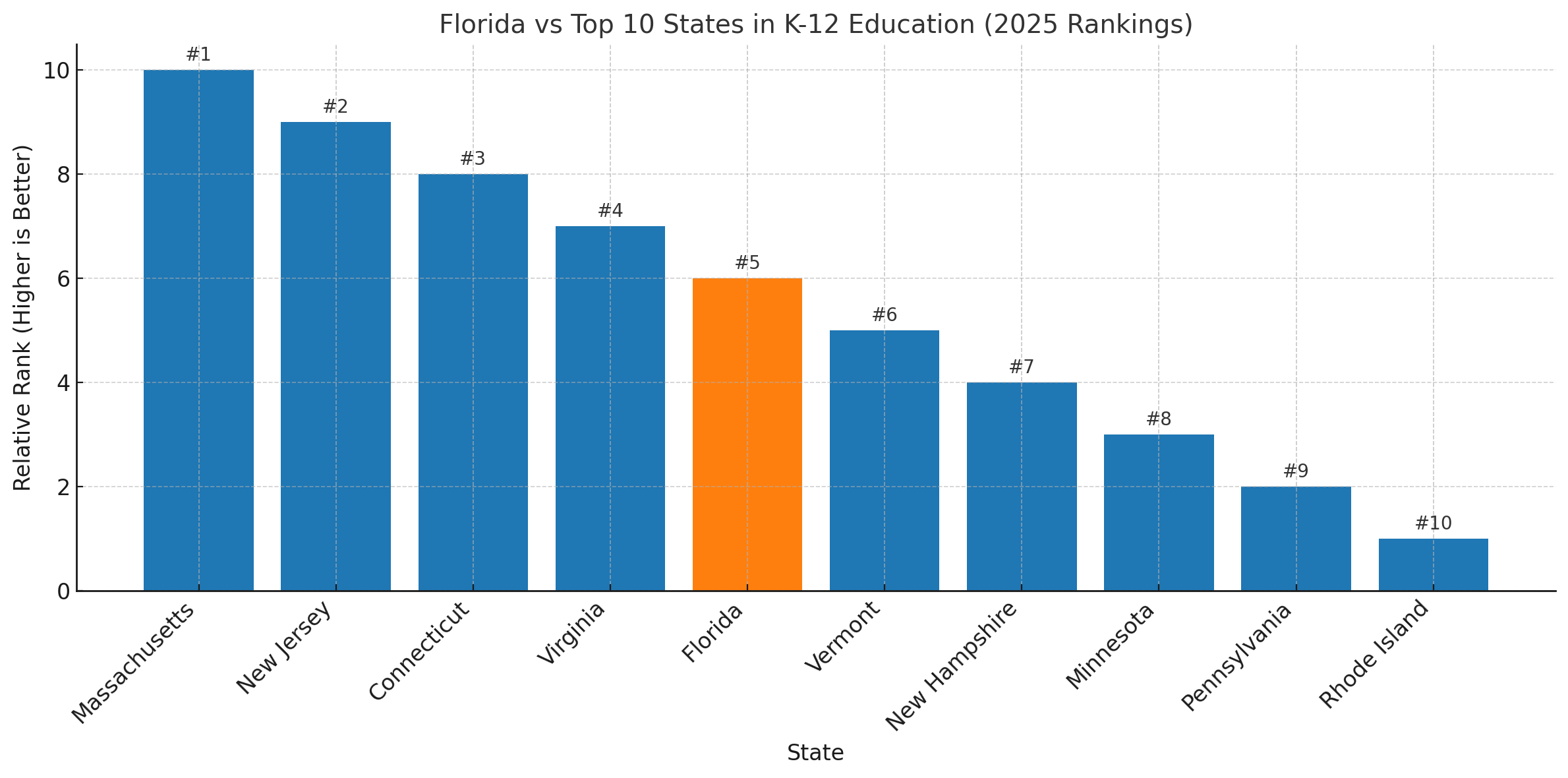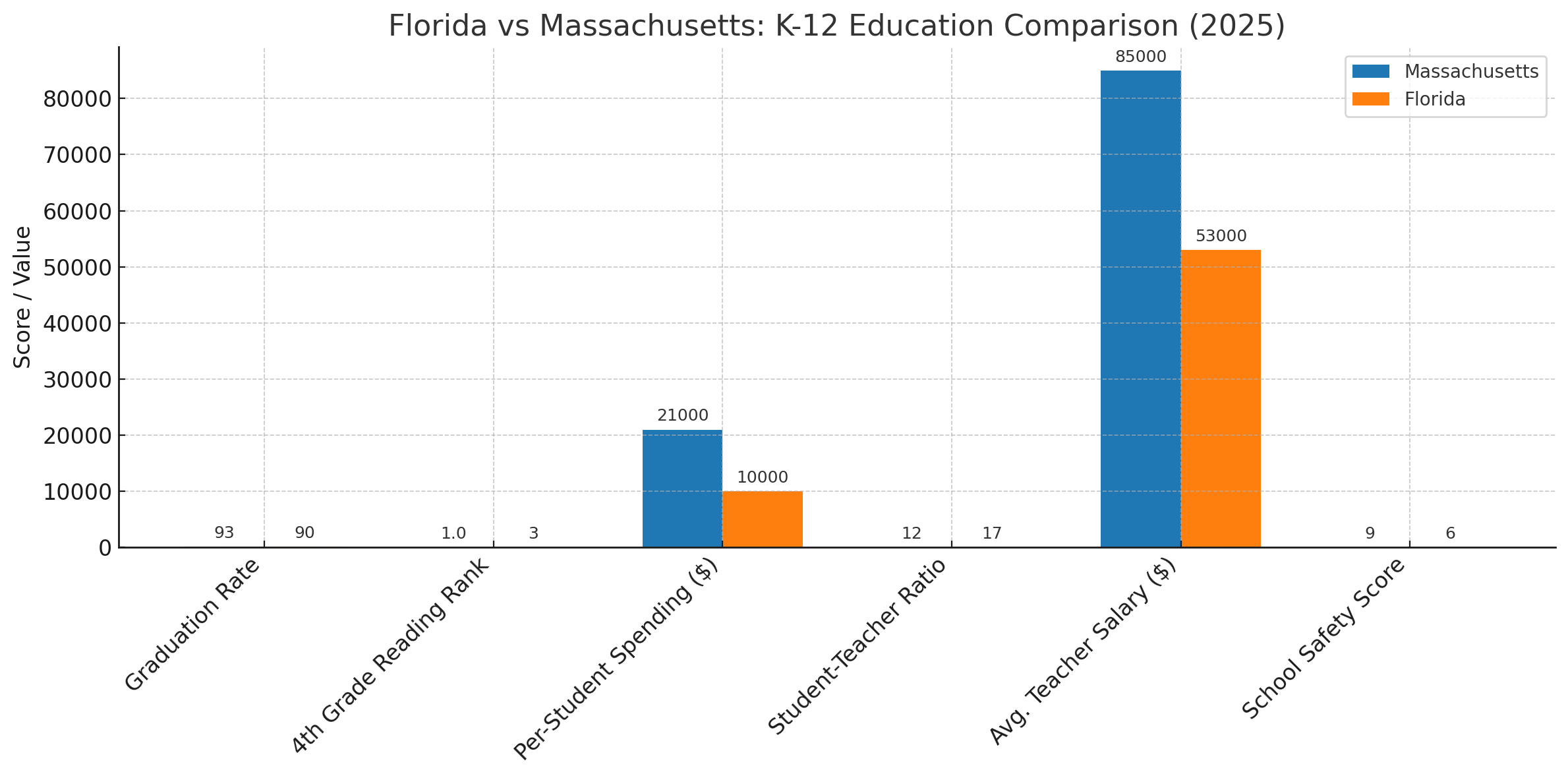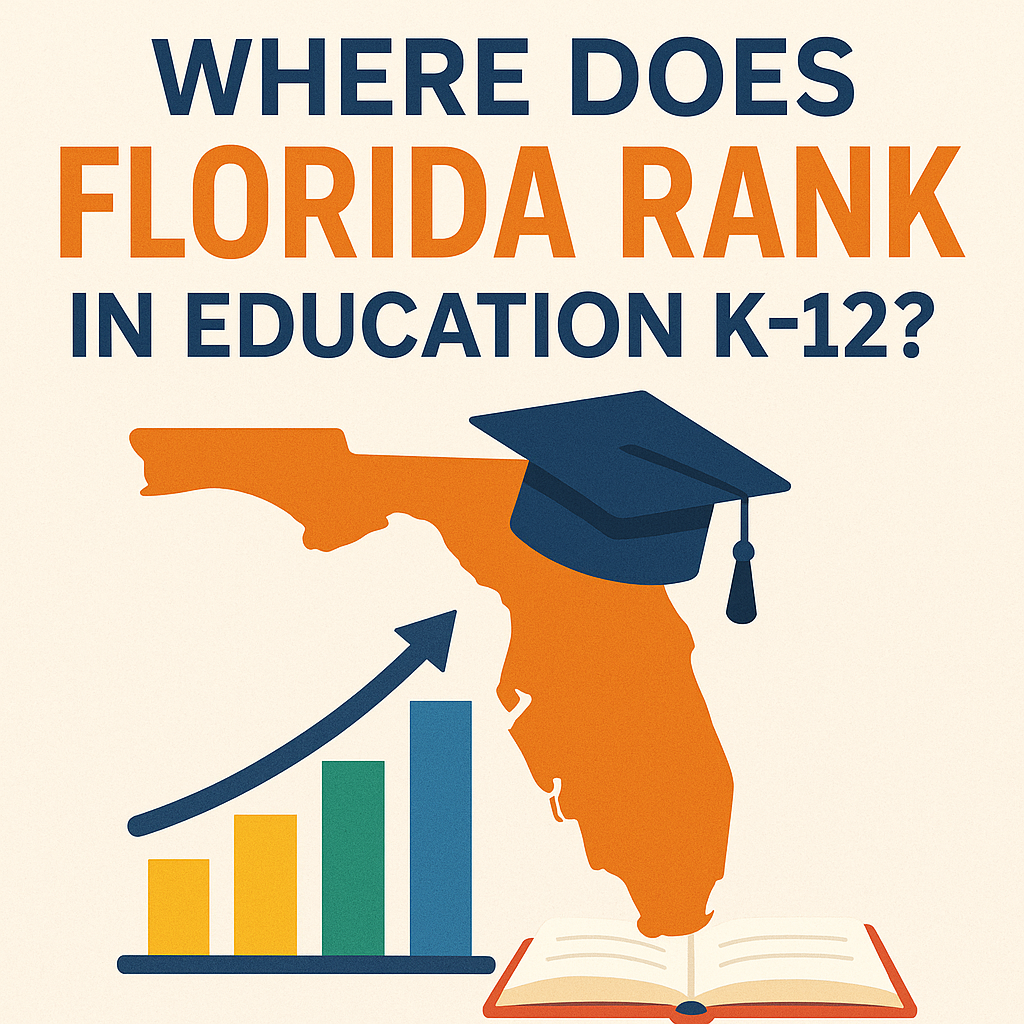Quick Answer: Florida’s K-12 education ranking varies depending on the specific metric and source. While Florida consistently performs well in areas like college readiness, graduation rates, and school choice, it also faces challenges in standardized test scores, funding equity, and teacher pay. Some reports rank Florida’s K-12 system in the top 10, while others place it around 20th–22nd, reflecting differences in methodology and evaluation criteria.
Introduction
In today’s fast-evolving educational landscape, K-12 education rankings are more than just numbers — they are a mirror reflecting a state’s commitment to academic excellence, equity, and student development. For millions of parents, educators, and policymakers across the U.S., these rankings serve as a key benchmark to assess how well a state prepares its students for higher education and the workforce.
But why has the spotlight turned so strongly on Florida’s K-12 education system in 2025?
Well, Florida has made headlines in recent years for climbing steadily in national rankings, especially in areas like early literacy, school choice, and standardized test scores. While traditionally overshadowed by education powerhouses like Massachusetts, New Jersey, and Connecticut, Florida’s rapid rise has sparked debates, policy analysis, and curiosity among education experts and parents alike.
Whether you’re a:
- Parent considering relocation,
- Educator researching state-wide trends,
- Student planning your academic path, or
- Education policy enthusiast following performance metrics,
…understanding where Florida ranks in education for K-12 is critical.
Why It’s More Relevant Than Ever in 2025:
- AI in classrooms is changing how we teach and assess students.
- Pandemic recovery gaps still exist — and some states have bounced back faster.
- Political decisions in Florida (curriculum reforms, book bans, school vouchers) have stirred national attention.
- School choice programs are expanding, altering the public-private school dynamic.
Quick Stat:
According to recent data from U.S. News & World Report, Florida currently ranks #1 in higher education and has consistently remained in the top 10 for K-12 performance, making it one of the few states excelling across both educational tiers.
In the sections that follow, we’ll break down exactly where Florida stands, how it compares to other states, what’s driving its performance, and whether it’s the right place for your child’s educational journey in 2025 and beyond.
Where Does Florida Rank in Education K-12? – The Latest 2025 Data
Florida has rapidly emerged as a top contender in the national K-12 education rankings, catching the attention of educators, policymakers, and parents across the country. As of 2025, Florida ranks among the top 5 states for overall K-12 education performance, according to multiple sources including U.S. News & World Report, WalletHub, and the National Assessment of Educational Progress (NAEP).

Where Does Florida Rank in K-12 Education in 2025?
| 📍 Ranking Source | 🏆 Florida’s 2025 Rank in K-12 Education |
|---|---|
| U.S. News & World Report | #5 |
| WalletHub (Quality + Safety Index) | #6 |
| Education Week’s Quality Counts | #7 |
| NAEP Performance (Avg. Score Rank) | Top 10 nationally |
Quick Fact: Florida ranks #1 in higher education (for the 7th consecutive year), which adds to its overall appeal for families focused on long-term academic success.
What Makes Florida’s Ranking Stand Out?
Florida’s consistent improvement isn’t by chance — it’s backed by policy reforms, school accountability measures, and expanded school choice programs. Here’s what contributes to its strong performance:
High Graduation Rates
Florida boasts a graduation rate above 90%, which is well above the national average. Statewide programs promoting credit recovery and vocational readiness have contributed to this boost.
Strong Literacy & Early Education Scores
Florida’s 4th-grade reading scores, according to NAEP, are among the top 3 in the nation — a direct result of its intensive reading intervention programs.
School Choice & Innovation
Florida is widely considered a pioneer in school choice, offering:
- Charter schools
- Magnet programs
- Private school vouchers
- Virtual school options
This flexibility has boosted competition and innovation across the public education system.
Accountability & Performance Metrics
Florida was one of the first states to implement A–F school grading systems, providing transparency in school performance and driving district-wide improvements.
How Does Florida Compare to Other States in Education?
How does Florida rank nationally in education?
In 2025, Florida is ranked among the top-performing states in K-12 education, competing closely with traditional frontrunners like Massachusetts, Connecticut, and New Jersey. While each state has unique strengths, Florida stands out for its student performance metrics, school choice programs, and gradual but consistent upward trend in rankings.

National Comparison: Florida vs. Top 10 States in K-12 Education
| 📌 State | 🎓 2025 K-12 Rank | 🎯 Key Strengths |
|---|---|---|
| Massachusetts | #1 | High funding, teacher quality, STEM focus |
| New Jersey | #2 | Low student-teacher ratio, high test scores |
| Connecticut | #3 | Strong literacy rates, student support systems |
| Virginia | #4 | Curriculum innovation, teacher retention |
| Florida | #5 | Reading scores, graduation rate, school choice |
| Vermont | #6 | Small class sizes, equity-focused reforms |
| New Hampshire | #7 | Civic education, low dropout rates |
| Minnesota | #8 | Math proficiency, career readiness programs |
| Pennsylvania | #9 | Pre-K investments, vocational programs |
| Rhode Island | #10 | Digital learning, student engagement |
Florida is the only Southern state in the top 5, showing how educational reform and accountability can elevate regional performance.
Factors Driving Florida’s Competitive Edge:
1. Strong Literacy Scores
Florida’s 4th-grade reading performance remains among the top 3 nationally (source: NAEP). This comes from targeted early education investments and reading recovery programs.
2. School Choice Ecosystem
Parents in Florida have multiple education pathways: public, charter, virtual, private (through vouchers), and magnet schools. This freedom of choice drives competition and academic innovation.
3. High Graduation Rates
Florida’s graduation rate is consistently above 90%, placing it above national averages.
4. Statewide Accountability
From A–F school grading to performance-based funding, Florida enforces strong school accountability systems.
Areas Where Florida Lags Behind:
While Florida performs well overall, it still faces challenges in:
- Per-student spending (ranks in the bottom 10)
- Teacher retention and pay
- Equity in rural and underprivileged areas
These gaps are important to consider when comparing Florida to more resource-rich states like Massachusetts or New Jersey.
In 2025, Florida ranks #5 nationally in K-12 education, outperforming most states in literacy, graduation, and school choice flexibility. However, it still trails behind top-tier states in areas like teacher pay and per-student funding, highlighting room for balanced improvement.
What State Has the Best K-12 Education System in 2025?
When it comes to K-12 education excellence in the United States, one state consistently sets the gold standard — Massachusetts. For over a decade, Massachusetts has ranked #1 nationally in K-12 education, owing to its high-performing schools, rigorous standards, and equitable funding policies.

Why Massachusetts Is Ranked #1 in K-12 Education:
| 📌 Metric | 📊 Massachusetts | 📊 Florida |
|---|---|---|
| Graduation Rate | 93.7% | 90.2% |
| 4th Grade NAEP Reading Scores | #1 | #3 |
| Per-Student Spending | $21,000+ | ~$10,000 |
| Student-Teacher Ratio | 12:1 | 17:1 |
| Teacher Salary (Avg.) | $85,000 | ~$53,000 |
| School Safety Score | High | Moderate |
Massachusetts excels due to:
- Early childhood education focus
- Strong STEM curriculum
- Consistent investment in teacher training and salary
- Equitable funding across school districts
Florida vs. Massachusetts: Different Models, Similar Goals
While Massachusetts dominates in terms of traditional academic indicators and funding, Florida’s model is centered on innovation, school choice, and accountability. Here’s a snapshot comparison:
| ⚖️ Category | 🏆 Massachusetts | 🌴 Florida |
|---|---|---|
| Model of Education | Traditional & High Investment | Reform-Driven & Choice-Based |
| Governance Style | Centralized | Decentralized |
| Education Spending Focus | Teacher Training & Resources | Accountability & Tech Adoption |
| Growth Rate (2015–2025) | Steady | Rapid |
💡 Did You Know? Despite spending 50% less per student, Florida ranks just 4 spots behind Massachusetts in overall K-12 performance.
Massachusetts is ranked #1 in K-12 education for 2025, maintaining its lead with strong funding, top-tier teacher quality, and consistent academic performance. Florida, however, is quickly closing the gap with innovative reforms and competitive graduation rates — all while spending significantly less per student.
Where Does Florida Rank Among the Most Educated States in the U.S.?
When we shift the lens from K–12 rankings to overall educational attainment, Florida presents a mixed yet improving profile. While Florida ranks in the top 5 in higher education (according to U.S. News), it falls behind in adult education levels compared to states like Massachusetts, Colorado, and Connecticut.
2025 Rankings: Most Educated States (By Educational Attainment)
| 📌 Rank | State | % Adults with Bachelor’s or Higher | Higher Ed Rank | Overall Education Score |
|---|---|---|---|---|
| 1️⃣ | Massachusetts | 45.8% | #2 | 9.9/10 |
| 2️⃣ | Colorado | 44.4% | #4 | 9.8/10 |
| 3️⃣ | Connecticut | 43.2% | #3 | 9.7/10 |
| 4️⃣ | New Jersey | 41.9% | #5 | 9.6/10 |
| 5️⃣ | Maryland | 41.5% | #6 | 9.5/10 |
| 🔟 | Florida | 34.1% | #1 | 8.3/10 |
📌 Florida ranks #10 in terms of educational attainment, but #1 in higher education quality — a unique contrast highlighting both progress and untapped potential.
What Boosts Florida’s Education Reputation?
1. Leading in Higher Education
Florida has ranked #1 in higher education for seven consecutive years (U.S. News), thanks to:
- Low in-state tuition
- High 4-year graduation rates
- Low student debt burden
- Research-focused public universities like the University of Florida and Florida State University
2. Workforce-Oriented Programs
Florida’s technical colleges, community colleges, and vocational training programs are well-funded and job-market aligned — helping residents upskill affordably.
3. Growing Talent Pipeline
Due to an influx of tech companies, startups, and finance hubs (like Miami), Florida is investing more into STEM education, upskilling, and adult literacy.
Challenges Still Faced:
- Below-average adult literacy in rural regions
- Limited graduate school access in certain areas
- Income-based education gaps in lower-income communities
- Teacher shortages in high-demand urban districts
In 2025, Florida ranks #10 for overall educational attainment, despite being #1 in higher education quality. While the state excels in college affordability and graduation outcomes, it trails behind top states in adult education levels and advanced degree holders — a gap Florida is actively working to close.
Challenges Facing Florida’s K–12 System
Despite Florida’s impressive rise in national K–12 rankings, several deep-rooted challenges continue to affect the consistency and equity of its education outcomes. These issues not only impact current student performance but also have long-term consequences on workforce readiness and college preparedness.
1. Teacher Shortages Across the State
Florida is facing a critical shortage of certified teachers, particularly in subjects like math, science, and special education. According to the Florida Education Association, the state began 2025 with over 4,000 unfilled teaching positions.
Why it matters:
- Larger class sizes reduce student-teacher interaction.
- Students in underserved areas are most impacted.
- Emergency certifications are increasingly used, potentially compromising instructional quality.
SEO keywords: Florida teacher shortage 2025, Florida education crisis, teacher vacancies in Florida schools
2. Funding Discrepancies Between Districts
Florida’s education funding structure relies heavily on local property taxes, which leads to significant funding disparities between wealthy and low-income districts.
Key stats:
- Some urban districts receive up to 30% more per student than rural ones.
- Wealthier counties can afford advanced STEM labs, smaller classrooms, and extracurricular programs.
- Title I schools, which serve high-poverty populations, often struggle to match resources.
SEO keywords: Florida school funding inequality, education budget Florida, public school spending Florida
3. The Urban-Rural Education Divide
While urban districts like Miami-Dade and Orange County benefit from larger budgets and better access to teachers and technology, rural counties often lack basic infrastructure such as broadband internet and STEM resources.
Key challenges in rural areas:
- Fewer AP and honors courses
- Higher dropout rates
- Limited access to after-school programs and mental health counselors
This divide affects students’ academic performance and college readiness, reinforcing generational cycles of underachievement.
SEO keywords: rural vs urban schools in Florida, education inequality in Florida, rural school challenges
4. Over-Reliance on Standardized Testing
Florida’s K–12 accountability system has long been centered on standardized tests like the Florida Assessment of Student Thinking (FAST), which replaced the FSA. While testing helps measure student growth, many educators argue that the system places too much pressure on students and teachers.
Problems with high-stakes testing:
- Teaching often becomes “to the test,” narrowing the curriculum.
- Schools in low-income areas are penalized disproportionately.
- Teacher evaluations and funding are tied to test performance, creating systemic inequities.
A System in Transition
Florida’s K–12 education system is navigating a phase of growth and reform, but challenges like unequal funding, teacher shortages, and the urban-rural divide must be addressed for the state to move from a top-5 contender to a national leader in educational equity and excellence.
University of Florida’s National and Global Education Rankings
The University of Florida (UF) plays a major role in elevating the state’s overall academic profile. As Florida’s flagship public university, UF consistently ranks among the best institutions both nationally and globally, making it a centerpiece of the state’s higher education success.
National Rankings (2025)
According to U.S. News & World Report, the University of Florida ranks:
- #5 among public universities in the U.S.
- #28 among all national universities (public + private)
- Top 20 for undergraduate education programs
- Top 10 in online bachelor’s programs
UF’s education-focused colleges — including the College of Education, College of Liberal Arts and Sciences, and College of Agricultural and Life Sciences — receive national recognition for academic rigor and research productivity.
Key strengths:
- Faculty-to-student ratio: 17:1
- Freshman retention rate: 97%
- Graduation rate: 88%
- Median starting salary after graduation: $56,000
SEO Keywords: University of Florida education ranking, UF national ranking 2025, top public universities USA, UF teacher education programs
Global Rankings
UF is also globally recognized for its research, innovation, and online education platforms. In the 2025 QS World University Rankings, UF is positioned at:
- #158 globally
- Top 100 in Education as a Subject
- Top 75 for Research Impact (Citations per Faculty)
These metrics place UF in the company of globally elite institutions while maintaining affordability and accessibility for Florida residents.
SEO Keywords: University of Florida global rank, QS ranking UF, best education universities in the world, top research universities USA
Contributions to Florida’s Education Ecosystem
The University of Florida directly impacts K–12 education across the state through:
- Teacher certification programs
- EdTech innovation and partnerships
- Rural school outreach initiatives
- STEM pipeline programs for high school students
UF alumni frequently become educators, policymakers, and administrators within Florida’s K–12 system, creating a powerful feedback loop that raises the standard of teaching across the state.
The University of Florida ranks among the top 5 public universities in the U.S. and top 100 globally in education. With elite programs, strong graduation rates, and research-driven teacher training, UF is a cornerstone of Florida’s national and international education success.
Is Florida a Good Place for Education?
The answer isn’t just a simple yes or no — because Florida’s education system is full of contrasts. On one hand, the state has made remarkable gains in recent years, but on the other, it still faces structural challenges that prevent it from achieving consistent excellence statewide.
Strengths That Make Florida a Competitive State for Education
1. School Choice Programs
Florida is a national leader in school choice. Students can enroll in charter schools, magnet schools, virtual schools, or use education savings accounts (ESAs) for private schooling.
2. High Graduation and Literacy Rates
Florida boasts one of the highest high school graduation rates in the country. In 2025, it surpassed 90%, reflecting a sustained upward trend since 2010.
3. Top-Ranked Higher Education System
As covered earlier, Florida ranks #1 in higher education, offering low tuition, high college graduation rates, and minimal student debt — all critical for long-term success.
4. Nationwide Recognition for Early Literacy
Thanks to initiatives like the Florida Reading Scholarship and third-grade reading intervention policies, the state consistently performs in the top 3 nationally in fourth-grade reading proficiency.
Ongoing Concerns for Parents and Educators
1. Funding Equity
There are significant disparities between affluent suburban schools and under-resourced rural or inner-city schools.
2. Teacher Retention
The state continues to struggle with high teacher turnover due to relatively low pay, leading to instability in school staffing and quality.
3. Test-Centered Curriculum
Many critics argue that Florida’s heavy emphasis on standardized testing limits creativity, critical thinking, and whole-child development.
4. Access Gaps in Rural Areas
Rural schools often face connectivity issues, limited extracurricular opportunities, and reduced access to advanced coursework like AP and dual enrollment programs.
Verdict: A State in Educational Transition
Florida is a good place for education — for many, but not all. It offers some of the best opportunities in the country, especially in higher education and early literacy, but challenges like teacher shortages, funding gaps, and rural inequalities still affect access and quality.
Strengths vs. Challenges in Florida’s Education System
| ✅ Strengths | ⚠️ Challenges |
|---|---|
| #1 in Higher Education Quality | Teacher shortages in core subjects |
| High school graduation rate > 90% | Inconsistent school funding across counties |
| Top 3 in early literacy (Grade 4 reading) | Over-reliance on standardized testing |
| Wide school choice and ESA options | Rural-urban education divide |
What Is the Best K–12 School in Florida?
When it comes to identifying the best K–12 school in Florida, the answer depends on several factors — including academic performance, specialized programs, teacher-to-student ratio, and extracurricular offerings. However, year after year, certain schools consistently stand out for their excellence in all these areas.
Top-Ranked K–12 School in Florida (2025)
According to Niche.com, which evaluates thousands of schools nationwide using a blend of academic data, test scores, parent/student reviews, and college readiness indicators, the best K–12 school in Florida in 2025 is:
Pine View School
Location: Osprey, Florida
Type: Public (Magnet School)
Grades: 2–12
Overall Niche Grade: A+
Student–Teacher Ratio: 17:1
SAT Average: 1380
Graduation Rate: 100%
Why Pine View Stands Out:
- Pine View is consistently ranked not only as Florida’s best K–12 school but also among the top 25 public schools in the U.S.
- It provides a rigorous gifted curriculum, strong college counseling, and a wide range of AP and honors courses.
- Many Pine View graduates are accepted into Ivy League and top-tier universities.
Other Notable High-Performing K–12 Schools in Florida
| School Name | Location | Type | Key Strengths |
|---|---|---|---|
| American Heritage School | Plantation/Boca | Private | STEM, fine arts, and pre-med/pre-law tracks |
| Carrollton School of the Sacred Heart | Miami | Private (All-girls) | Academic excellence, global citizenship |
| School for Advanced Studies | Miami | Public (Magnet) | Dual-enrollment with Miami Dade College |
| Stanton College Preparatory | Jacksonville | Public | Consistently high AP and IB scores |
Factors That Define a “Top” K–12 School
- College Placement Rates
- Standardized Test Scores (SAT/ACT)
- Curriculum Rigor (AP, IB, Dual Enrollment)
- Extracurricular Opportunities
- STEM and Arts Programs
- Student/Parent Satisfaction Ratings
Parents evaluating top K–12 options in Florida should consider both rankings and fit — some students may thrive in competitive academic environments, while others may need more specialized or inclusive learning settings.
Where Does Florida Rank in Education Overall?
Florida’s overall education ranking combines performance across K–12 education, higher education, and educational attainment. While rankings vary slightly across different organizations, Florida consistently places in the top 10–15 nationally, with certain standout metrics pushing it even higher.
Florida’s Overall Education Ranking in 2025
According to multiple authoritative sources:
| Source | Florida’s 2025 Rank | Focus Area |
|---|---|---|
| U.S. News & World Report | #14 overall | K–12 + Higher Education + Attainment |
| WalletHub | #10 overall | Quality & Safety of K–12 and Higher Ed |
| Education Week | #5 in K–12 | School performance & policy |
| Forbes Education Index | #1 in Higher Ed | Affordability, Graduation, Access |
Key Strengths Contributing to Florida’s High Ranking
- Strong School Accountability System: Florida uses data-driven performance metrics to evaluate schools.
- High Graduation Rates: Over 90% graduation rate in public high schools.
- Affordable Public Universities: In-state tuition remains among the lowest nationally.
- Widespread School Choice: Florida leads in charter schools, magnet programs, and voucher systems.
Educational Attainment: A Relative Weak Spot
Despite impressive gains in K–12 and higher ed, Florida ranks #10–#15 in educational attainment. This metric looks at:
- % of adults with associate, bachelor’s, or graduate degrees
- Workforce skill development
- Continuing education participation
States like Massachusetts, Connecticut, and Colorado still outpace Florida in this area due to a longer legacy of higher adult education levels.
Florida’s Overall Education Position
| Education Dimension | Florida’s Rank | National Average | Florida’s Trend |
|---|---|---|---|
| K–12 Education | #5 | — | Rising |
| Higher Education Quality | #1 | — | Stable |
| Educational Attainment | #12 | — | Improving |
| Overall Ranking | #10–14 | #25 | Strong Growth |
Florida ranks between #10 and #14 overall in education, thanks to its strong K–12 and top-rated higher education system. While it still trails some states in adult educational attainment, its upward momentum signals a system in transformation — and national competitiveness.
Frequently Asked Questions
1. How does Florida rank nationally in education?
Florida ranks #5 in K–12 education and #1 in higher education, according to U.S. News & World Report 2025. Its overall education ranking falls between #10 and #14, depending on the source. The state’s consistent performance in student outcomes, college readiness, and affordability has contributed to its national rise.
SEO Terms: Florida national education rank, where Florida stands in education 2025
2. What state has the best K–12 education system?
As of 2025, Massachusetts is ranked #1 in K–12 education, followed by states like New Jersey, Connecticut, and Florida, which currently holds the #5 position due to gains in literacy, graduation rates, and curriculum standards.
LSI Keywords: best education states USA, K-12 rankings by state
3. Where does Florida rank in the most educated states?
Florida ranks approximately #12 in educational attainment, according to WalletHub and Census-based data. While it leads in current K–12 and higher ed performance, a lower percentage of adults with graduate or professional degrees keeps Florida just outside the top 10.
SEO Focus: most educated states 2025, Florida adult education ranking
4. What is the University of Florida ranked in education?
The University of Florida ranks:
- #5 among public universities (U.S. News 2025)
- Top 100 globally in education as a subject (QS Rankings)
- Top 10 for online bachelor’s programs
Its College of Education is widely respected for research, teacher training, and curriculum innovation.
Keywords: UF education ranking, best public universities USA
5. Is Florida a top 5 university?
If referring to UF, it ranks #5 among public universities in the U.S., but not overall (public + private). It is still a top-tier national university and is widely regarded for its affordability, outcomes, and research output.
LSI Terms: top 5 public universities, UF vs national universities
6. What is Florida ranked for schools?
Florida is ranked:
- #5 for K–12 education
- #1 for higher education
- These ranks consider student performance, graduation rates, teacher qualifications, and college readiness.
SEO Variants: Florida school rank 2025, K12 rankings Florida
7. What is the best K–12 school in Florida?
The top-rated K–12 school in Florida is Pine View School in Osprey. It’s a public magnet school for gifted students, serving grades 2–12, and is consistently ranked among the top 25 public schools nationwide.
Keywords: best public high school Florida, Pine View school rating
8. Is Florida a good place for education?
Yes. Florida offers:
- A diverse range of school choice options
- High graduation rates
- Top-ranked public universities
However, challenges like funding disparities and rural access still exist, especially in underserved communities.
SEO Variants: is Florida education good, pros and cons of Florida schools
9. Where Does Florida Rank in Education K-12?
Florida ranks:
- #5 in K–12 education
- #1 in higher education
- #10–14 overall in education
- #12 in educational attainment
It is one of few states with strong performance across multiple dimensions of the educational system.
Conclusion
Florida’s K–12 education system is undergoing a transformative rise — from modest national standings a decade ago to a current Top 5 position in 2025. This dramatic improvement is the result of policy-driven accountability, literacy-focused early education, and a robust commitment to school choice and innovation.
While challenges like teacher shortages, funding disparities, and standardized testing pressures remain, Florida has demonstrated that strategic reforms and data-informed practices can lead to meaningful results.
Equally impressive is Florida’s #1 national rank in higher education, providing students with a full-spectrum educational pipeline — from quality public schools to world-class universities like the University of Florida.
Final Takeaway
Florida ranks #5 in K–12 education and #1 in higher education, making it one of the most dynamic and improving education systems in the U.S. With a forward-focused approach and continued investment, it is well on its way to becoming an education powerhouse.

